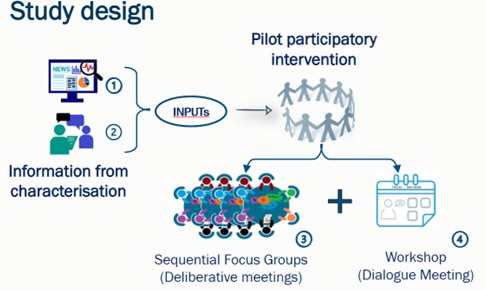
In the trans-Pyrenean region, bovine tuberculosis (bTB) eradication programs are developed in a social context marked by fatalistic attitudes towards the control of the disease and a great mistrust between the different actors that makes the acceptability of the eradication program difficult. The discursive strategies used in public debates can give rise to different perceptions and opinions, and influence the degree of trust between stakeholders and their level of commitment. For this reason, one of the objectives of the INNOTUB ) project has been to characterize communication about bTB between livestock farmers and veterinarians in the trans-Pyrenean region and, through participatory actions, develop recommendations to improve existing communication strategies. The study revealed the existence of a controversial debate on bTB in which each group defends different positions: veterinarians and researchers “fight” against bTB and “move forward” towards eradication, while livestock farmers are situated in a framework of “sacrifice”, playing a largely passive role. The heterogeneous understanding of the disease is also reflected in the topics discussed: institutional and scientific communication focuses almost exclusively on the detection and control of the disease. On the contrary, livestock farmers extend their communication to a greater variety of topics, indicating their concern for different aspects related to bTB and not only for the disease itself.
The results highlight the need to create a common vision (and language) about TBb, broadening the debate on issues that directly affect and/or concern livestock farmers. It is also important to empower and make livestock farmers visible, as active subjects and fundamental actors of control programs. In addition, the participative activities carried out with livestock farmers and veterinarians proposed a series of improvements in current communication about bTB, with the elaboration of the following proposals: (i) Create participatory meeting spaces to share information, make reflections together and contribute to the search for solutions. (ii) Give more value to the work done by livestock farmers and private veterinarians. (iii) Improve the accessibility of data (on epidemiological situations). (iv) Develop clear (and written) protocols and produce visual informational material (infographics, short videos, cards, etc.). (v) Redesign training and accreditation courses, including content related to social and economic aspects, and providing tools that facilitate communication. (vi) Increase the participation of all actors in the design of the protocols; for example, establishing 'Local Committees' with representatives of livestock farmers, veterinarians and official services that can support decision-making on specific cases. However, for this to be possible, both the livestock sector and private veterinarians should organize and hold an internal debate to identify needs, priorities and obstacles that hinder daily work and, in this way, be better prepared to participate in decision-making processes.
This study, led by the UAB in the framework of the INNOTUB project (grant number EFA357/19/INNOTUB), has been financed by the Interreg-POCTEFA 2014-2020 program and co-financed by the European Regional Development Fund (FEDER). Its results have been published in the journal Preventive Veterinary Medicine and the article is freely accessible at the following link.
